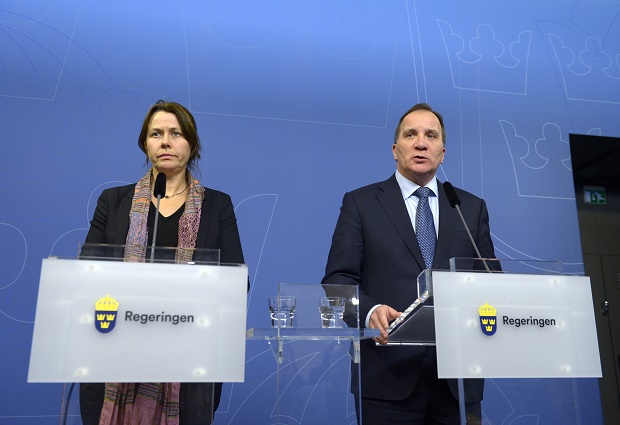
Swedens Prime Minister Stephen Lofven, right, and Deputy Prime Minister Asa Romson present stricter rules for refugees seeking asylum in Sweden during a press conference at the Government headquarters in Stockholm, Sweden Tuesday, Nov. 24, 2015. The Swedish Government tightens immigration policy to the EU minimum levels, all in an attempt to convince other EU member states to help shoulder the burden of the refugee crisis. TT via AP
MALMÖ, Sweden—Aneta Moura, who emigrated to Sweden from Greece 43 years ago, says the last ethnic Swede has moved off her street in Malmo’s Rosengard neighborhood and youths with nothing to do hang out on the streets at all hours.
READ: Migration tests Sweden’s ‘humanitarian superpower’ image
“I no longer know any of my neighbors,” laments 81-year-old Moura.
Growing segregation between ethnic Swedes and immigrants is emerging as a major concern in Sweden, a country that has for decades prided itself on its egalitarian ideals and where most low-skilled jobs have been eliminated in a bid to do away with much of the “class society” that went with them.
The country’s inability to integrate immigrants is pre-occupying the Swedish public and policymakers now that Sweden is taking in record numbers of refugees who will eventually need to find work to become fully-fledged active members of society.
Many wonder what kind of jobs these new immigrants—many of whom are uneducated, some even illiterate—will be able to hold down in Sweden’s knowledge-intensive labour market.
Moura, who came to Sweden to work in its booming factories half a century ago, says the loss of manufacturing jobs has made it harder for newcomers to integrate.
“We have a lot of youths standing on the streets all night right where I live,” she said.
The Scandinavian country has long been Europe’s top destination for asylum seekers per capita, with a record 190,000 applications expected this year.
As the country’s public services strain to cope with the influx, Prime Minister Stefan Lofven this week announced a drastic tightening of Swedish asylum rules to stem the flow of migrants.
Many obstacles to integration
In addition to job woes, immigrants trying to rebuild their lives here face a slew of obstacles to their integration.
They include learning the language, finding housing amid shortages in big cities and rising anti-immigration sentiment with the far-right Sweden Democrats garnering up to 27 percent of voter sympathies in recent polls.
Half of all refugees in Sweden are unemployed after seven years and only 60 percent find work after 15 years, according to Statistics Sweden.
“What we previously thought was a good thing about Sweden—eliminating simple jobs… is now our biggest challenge when people from other countries arrive,” said Andreas Bergh, an associate professor of economics at Lund University.
“Unfortunately those types of jobs are exactly what you need for immigrants from poorer countries with less education to quickly enter the job market,” he said.
Unemployed immigrants on the margins of society run counter to Sweden’s aim to provide equal opportunities for everyone to belong to the educated, professional sector.
In Sweden, for instance, daycare is heavily subsidised to enable all women to hold down jobs, which eight out of 10 do; child allowances are the same for everyone regardless of need; rent control is widespread; university education is free; and the country has a narrow gap between the highest and lowest wages.
In Malmo, Sweden’s third largest city, 43 percent of the population comes from an immigrant background.
With growing numbers of refugees from countries like Iraq, Somalia and Afghanistan, dozens of neighbourhoods like Rosengard have seen relative poverty levels rise and housing conditions deteriorate.
In 38 immigrant-heavy suburbs, the average disposable income dropped from 83.8 percent of the national average in 1997 to 69.7 percent in 2014, the left-leaning Verdandi group said in a recent report.
Is tolerance detrimental?
Sweden is often rated in global surveys as one of the most tolerant countries on earth, but some say that tolerance for other cultures could actually be one of the causes of segregation.
Aje Carlbom, an anthropologist at Malmo University who lived in Rosengard as part of a project, criticised the country’s policy of multiculturalism, which he said had encouraged immigrants “not just to keep, but even develop their own cultures.”
“People get stuck in a type of ethnic network that makes it very hard to get contacts within the rest of society,” he said.
And frustration is growing over immigrants’ difficulties to integrate—even among immigrants.
“The politicians should first think about the people who are (already) here” before taking in more migrants, Moura complained.
Politicians have tried to get more immigrants into the job market by launching numerous educational projects and paid internships.
But Syed Masroor Ahmad, a 45-year-old of Pakistani origin, said Sweden’s work placement schemes don’t work.
People get offered “internships for one, two or three months, but after that they don’t offer them a job,” he said.
For some employers, the question becomes why they should hire someone like Ahmad for a full, relatively high Swedish salary, when they can easily replace him with another intern whose paycheck is subsidised by the government.
Some are however trying to make the most of the situation.
Outside the Rosengard job centre, 20-year-old Ehssan Alla Al-Den Abbas, born and raised in Rosengard, said the refugee influx could mean job opportunities.
“I’m applying for all kinds of things. It would be good if I could get a job helping refugees,” he said.
RELATED STORIES
EU warns of refugee ‘catastrophe’ as winter closes in
Canada to give UN $75 million for Syrian refugee relief